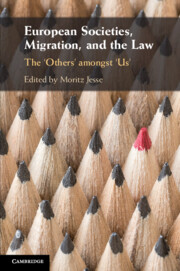Book contents
- European Societies, Migration, and the Law
- European Societies, Migration, and the Law
- Copyright page
- Dedication
- Contents
- Figures and Tables
- Contributors
- Preface
- Acknowledgements
- Abbreviations
- 1 European Societies, Migration, and the Law
- Part I Making the ‘Other’ – The Construction of ‘Otherness’
- Part II The Operation of Legal ‘Othering’ and the National–Foreigner Dichotomy in the EU
- 6 The Rights of ‘Others’ in Domestic Constitutions
- 7 Hierarchies of Privilege
- 8 Alienation of ‘Second Generation Turkish Dutch’ in the Name of ‘Integration’
- 9 Different Levels of ‘Legal Otherness’ in the Context of Expulsion and Entry Bans
- 10 The Non-national as ‘The Other’
- Part III After the Arrival of the ‘Others’ – Reactions to the ‘Refugee Crisis’ of 2015
- Part IV ‘Othering’ in the EU
- Part V European Societies, ‘Otherness’, Migration, and the Law
- Bibliography
- Index
7 - Hierarchies of Privilege
Juxtaposing Family Reunification Rights, Integration Requirements, and Nationality in EU Law
from Part II - The Operation of Legal ‘Othering’ and the National–Foreigner Dichotomy in the EU
Published online by Cambridge University Press: 13 November 2020
- European Societies, Migration, and the Law
- European Societies, Migration, and the Law
- Copyright page
- Dedication
- Contents
- Figures and Tables
- Contributors
- Preface
- Acknowledgements
- Abbreviations
- 1 European Societies, Migration, and the Law
- Part I Making the ‘Other’ – The Construction of ‘Otherness’
- Part II The Operation of Legal ‘Othering’ and the National–Foreigner Dichotomy in the EU
- 6 The Rights of ‘Others’ in Domestic Constitutions
- 7 Hierarchies of Privilege
- 8 Alienation of ‘Second Generation Turkish Dutch’ in the Name of ‘Integration’
- 9 Different Levels of ‘Legal Otherness’ in the Context of Expulsion and Entry Bans
- 10 The Non-national as ‘The Other’
- Part III After the Arrival of the ‘Others’ – Reactions to the ‘Refugee Crisis’ of 2015
- Part IV ‘Othering’ in the EU
- Part V European Societies, ‘Otherness’, Migration, and the Law
- Bibliography
- Index
Summary
This chapter focuses on EU laws and policies on family reunification in order to demonstrate how they create new ‘others’. The creation of Union citizenship disrupted the binary logic of ‘national’ and ‘foreigner’ in national immigration regulation even though, at first sight, it seemed to have recreated it at the EU level as the ‘EU citizen’ and ‘Third Country National’ (TCN). However, on a closer look, it becomes apparent that the new picture is much more complex, as a new hierarchy of statuses with different packages of rights has been created at the EU level for nationals, EU citizens, and TCNs alike. This chapter compares and contrasts family reunification rights of Union citizens and TCNs granted under the Treaties, international agreements, and secondary EU law and sheds light on the different degrees of ‘otherness’ and privilege created at EU level.
Keywords
Information
- Type
- Chapter
- Information
- European Societies, Migration, and the LawThe ‘Others' amongst ‘Us', pp. 130 - 151Publisher: Cambridge University PressPrint publication year: 2020
